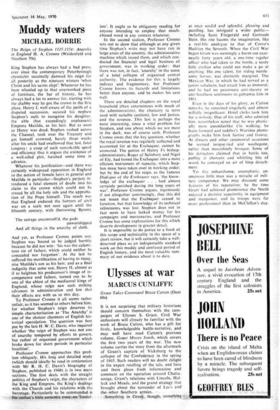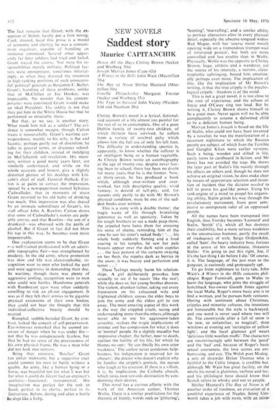Ulysses at war
MARCUS CUNLIFFE
Grant Takes Command Bruce Catton (Dent 60s)
It is not surprising that military historians should concern themselves with the cam-
paigns of Ulysses S. Grant. Civil War enthusiasts will already be familiar with the work of Bruce Catton, who has a gift for lively, knowledgeable battle-narrative, and may well have read Catton's previous volume, Grant Moves South, which covers the first two years of the war. The new volume carries the story from the aftermath of Grant's capture of Vicksburg to the collapse of the Confederacy in the spring of 1865. Such readers will no doubt delight in the expert retelling of the tale, and here and there glean fresh information and comment on the operation around Chatta- nooga, Grant's relations with Lincoln, Hal- leck and Meade, and the grand strategy that brought about the surrender of Lee's and the, other Southern armies. , Something in Granl, though, something Pt at once sordid and splendid, pleasing and puzzling, has intrigued a wider public—
including Scott Fitzgerald and Gertrude Stein. His rise haunts the imagination, like a real-life analogue to that of Corvo's Hadrian the Seventh. When the Civil War began Grant was seemingly a burnt-out case: nearly forty years old, a one-time regular officer who had taken to the bottle, a seedy little civilian who could not make a go at anything. His one talent, for riding mettle- some horses, was distinctly marginal. The Mexican War, in which he had served as a junior subaltern, had struck him as immoral, and he had no passionate anti-slavery or anti-Southern sentiments to galvanise him in 1861.
Even in the days of his glory, as Catton remarks. he remained singularly and almost wilfully insignificant. Hotel clerks took him
for a nobody. One of his staff, who admired him, nevertheless noted that he was physic-
ally most unsoldierlike ('in walking, he leans forward and toddles'). Wartime photo- graphs make him look furtive and frowsy.
At dinners and other ceremonial occasions he seemed tongue-tied and woebegone, rather than masculinely brusque. Some of his detractors claimed that in battle. too, puffing at cheroots and whittling bits of wood, he conveyed an air of limp detach- ment.
Yet this unhandsome, unemphatic, an- onymous little man was a miracle of mili- tary competence. We may discount some features of his reputation; by the time Grant had achieved prominence the North enjoyed a decisive superiority in equipment and manpower, and its troops were far more professional than in McClellan's day.
The fact remains that Grant, with the ex- ception of Shiloh, hardly put a foot wrong.
Cool, shrewd, lucid (his prose is a model of economy and clarity), he was a consum- mate organiser, capable of handling an immense command. Several other appar- ently far finer soldiers had tried and failed. Grant stayed the course. Nor were his re- sponsibilities merely military. Political fac- tors were omnipresent, sometimes infuriat- ingly, as when they dictated the retention in high-ranking positions of such unsuccess- ful 'political' generals as Benjamin F. Butlers Grant's handling of these problems, unlike that of McClellan or Joe Hooker, was impeccable. No wonder that his contem- poraries were convinced Grant would make an ideal President. The oddity is not that they put him in the White House but that he performed so miserably there.
But that, as we say, is another story. What made him tick as a soldier? The evi- dence is somewhat meagre, though Calton treats it resourcefully. Grant's wartime cor- respondence, mainly to his wife, is flat and laconic; perhaps partly out of discretion, he talks in general terms, or discusses school- ing for their children, instead of indulging in McClellanish self-revelation. His mem- oirs, written a good many years later, are similarly understated, and while on the whole accurate and honest, give a slightly distorted picture of his dealings with Lin- coln's chief of staff, General Halleck. Cat- ton is at pains to correct the impression, spread by a newspaperman named Sylvanus Cadwallader, that in moments of stress Grant reverted to his old habit of drinking too much. This impression was also shared by an intimate subordinate of Grant's, his staff officer John A. Rawlins. Canon shows that some of Cadwallader's stories are palp- ably untrue, and that Rawlins—the son of a drunkard—was obsessed with the perils of alcohol. But if Grant in fact did not blow his top in this way, he becomes even more impenetrable.
One explanation seems to be that Grant —a well-trained professional with an admir- able topographic flair—was strengthened by modesty. In the old army, where promotion was slow and life was claustrophobic, re- cognition went to men who looked the part and were aggressive in demanding their due. In wartime, though there was plenty of aggressive jostling, recognition went to men who could win battles. Handsome generals with flamboyant egos were often suddenly
unwilling to risk an all-out engagement. It
was as if they felt their armies to be gigantic physical extensions of their own bodies; they could not bear the thought that this individual-collective beauty should be marred.
Rumpled, stubble-bearded Grant, by con- trast, lacked the conceit of self-preservation.
Eye-witnesses remarked that he seemed un- aware of danger when he was under fire—
not that he was conspicuously fearless, but that he had no sense of the preciousness of his own physical frame. He was a man who did not look into mirrors.
Being thus unaware, 'Butcher' Grant (an unfair nickname, but a suggestive one) could commit his men to battle without a qualm. An army, like a human bfing or a horse, was beautiful not for what it was but for what it could do. Grant had an engineer's aesthetic—functional, instrumental. His imagination was perfect for the task to
hand, perfect in its clarity, perfect in its limitations. Before, during and after a battle be slept like a baby.



































 Previous page
Previous page